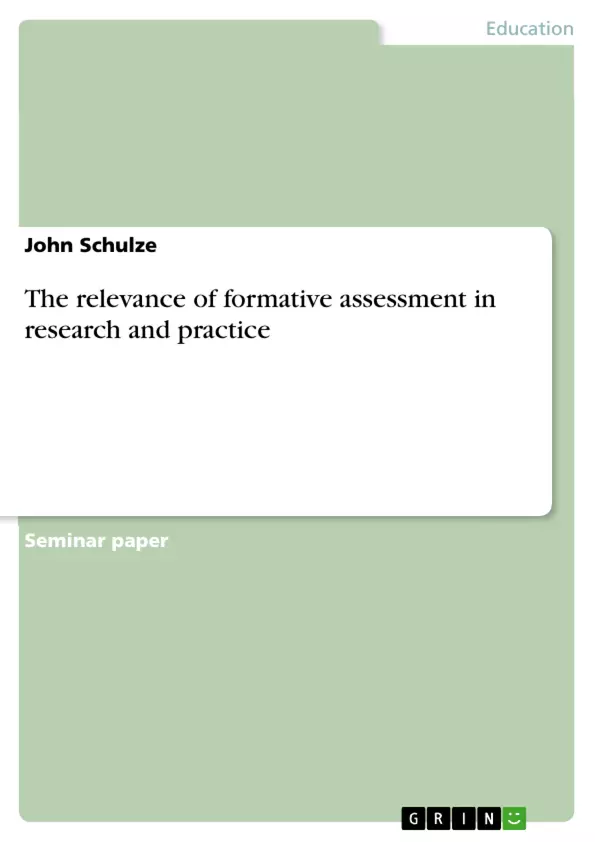Hattie found in his seminal meta-analysis of the impact of a large variety of factors on the success of learning that feedback was among the most powerful influences on achievement with an effect size of d = 0.78 (Hattie 2009). For any discipline dealing with education feedback and therefore formative assessment must be vital issues, as they are part of the answer to one of the most fundamental questions in these fields: How does learning work?
Inhaltsverzeichnis (Table of Contents)
- The role of formative assessment in current research..
- Formative vs. summative assessment
- Formative assessment and teaching.......
- References.......
Zielsetzung und Themenschwerpunkte (Objectives and Key Themes)
This paper explores the role of formative assessment in research and practice, aiming to provide a comprehensive overview of the concept and its implications for both teachers and learners. It examines the distinction between formative and summative assessment, highlighting the unique characteristics and objectives of each approach. The paper also delves into the application of formative assessment in teaching, considering its potential benefits and challenges.
- The importance of formative assessment in learning processes
- The distinction between formative and summative assessment
- The role of feedback in formative assessment
- Challenges and misconceptions surrounding the implementation of formative assessment
- The relationship between formative assessment and constructivist learning
Zusammenfassung der Kapitel (Chapter Summaries)
- The role of formative assessment in current research..: This chapter explores the significance of formative assessment in learning, drawing upon research by Hattie and others. It discusses the concept of feedback and its bidirectional nature, emphasizing the importance of student-to-teacher feedback. The chapter also highlights the ambiguity surrounding terminology related to formative assessment, including terms like "formative feedback" and "assessment for learning."
- Formative vs. summative assessment: This chapter differentiates between formative and summative assessment, outlining their respective objectives and approaches. It explains the distinction between criterion-referenced and norm-referenced summative assessment and highlights the diagnostic value of formative assessment in understanding individual learning processes.
- Formative assessment and teaching.......: This chapter examines the implementation of formative assessment in teaching practice, discussing its potential benefits and challenges. It addresses misconceptions surrounding formative assessment, such as the overestimation of feedback provided by teachers and the need for a more nuanced understanding of the concept. The chapter also highlights the importance of a systematic approach to formative assessment, emphasizing its role in individual learning and constructivist pedagogy.
Schlüsselwörter (Keywords)
Formative assessment, feedback, summative assessment, learning processes, constructivist learning, teacher feedback, student feedback, assessment for learning.
Frequently Asked Questions
What is formative assessment?
Formative assessment refers to ongoing evaluations during the learning process that provide feedback to improve student performance and teaching strategies.
How does formative assessment differ from summative assessment?
Summative assessment evaluates learning at the end of a unit (like a final exam), while formative assessment is diagnostic and happens during learning.
Why is feedback vital for learning success?
According to John Hattie, feedback has one of the highest effect sizes (d = 0.78) on achievement, making it a critical factor in how learning works.
What is "Assessment for Learning"?
It is another term for formative assessment, emphasizing that the primary goal of the evaluation is to support the learning process itself.
What are the challenges of implementing formative assessment?
Common challenges include teacher overestimation of the feedback they provide and the need for a systematic, constructivist approach to be effective.
- Quote paper
- M.A., M.A. John Schulze (Author), 2018, The relevance of formative assessment in research and practice, Munich, GRIN Verlag, https://www.grin.com/document/501010



